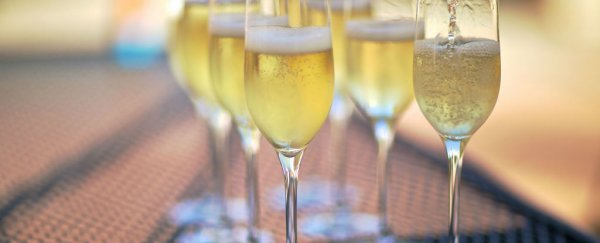If you've seen one of those viral headlines claiming that three glasses of champagne a day will stave off dementia, forget them right now. This false claim recently originated from an erroneous headline somewhere in UK tabloid-land, and unfortunately, lots of online publications just ran with it. It seemed too good to be true, so we looked into it - and here's what the science actually says.
It must have been a slow news day, because the study was actually published back in 2013. Health researchers from the University of Reading in England were investigating how certain phenolic acids found in champagne could affect spatial memory… in rats. Phenolic acids are aromatic compounds naturally found in many plants, including the skins of grapes used for making champagne and white wine. They're akin to flavonoids - natural plant pigments that serve as antioxidants in the human body - and are attributed with some of the benefits of red wine.
There is evidence that foods laden with flavonoids improve spatial memory in rodents by affecting nerves and blood vessels in the brain. Hence the researchers wanted to investigate whether phenolic acids might have a similar effect, too.
They started by taking three groups of eight rats each, and tested their spatial and working memory using a maze test, which involves a food reward for finding the correct route. After running a bunch of these maze tests, for the next six weeks each group of rats received either a small daily dose of champagne, a non-champagne alcoholic drink, or an alcohol-free drink, all with the same amount of calories.
Following six weeks of drinking (actually eating, as the drinks were mixed with powdered food), the rats were tested again, and the champagne group was indeed more accurate at finding the right path in the maze. When the scientists checked the rats' brains, they found an increase in various proteins that help with cell formation in the brain. The results were published in Antioxidants and Redox Signalling.
So where did the hype come from? According to the press release covering this study, one to three glasses of champagne a week could therefore counteract memory loss associated with aging. But according to an analysis from UK government's healthcare website NHS Choices, this claim is problematic:
"The media sources do not report responsibly on this early-stage animal research. The quantity of champagne consumed by the rats was said to be equivalent to 1.3 small glasses of champagne (around two units) a week for humans. And we can't be sure these results would apply to humans."
Which is a whole lot more measured than what one of the researchers, Jeremy Spencer, said in the press statement. "These exciting results illustrate for the first time that the moderate consumption of champagne has the potential to influence cognitive functioning, such as memory," he said. "We encourage a responsible approach to alcohol consumption, and our results suggest that a very low intake of one to two glasses a week can be effective."
As NHS Choices advises, this optimistic advice is best taken with a huge grain of salt. "A slightly improved maze performance in a small number of rats does not necessarily translate into humans having a reduced risk of dementia from drinking champagne," they write. "The health risks of consuming large amounts of alcohol are well-known."
Sorry guys, there's still no excuse to ramp up your intake of bubbly.
